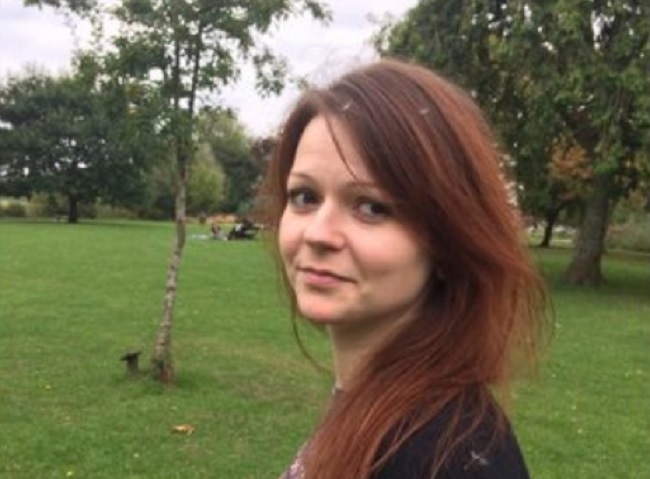The daughter of a Russian ex-spy poisoned in a nerve-agent attack is improving rapidly and is out of critical condition, the hospital treating the pair said Thursday — an unexpected piece of good news in a chilling mystery that has sparked an international crisis.

Sergei and Yulia Skripal were found unconscious and critically ill in the English city of Salisbury on March 4. British authorities say they were poisoned with a military-grade nerve agent made in Russia.
Salisbury NHS Trust, which oversees the hospital where the Skripals are being treated, said Thursday 33-year-old Yulia is “improving rapidly and is no longer in a critical condition. Her condition is now stable.”
WATCH: British police say nerve agent poisoned Russian ex-spy, daughter

“She has responded well to treatment but continues to receive expert clinical care 24 hours a day,” said Dr. Christine Blanshard, medical director at Salisbury District Hospital.
Sergei Skripal, 66, remains in critical condition, the hospital said.

Get daily National news
Skripal, a former Russian military intelligence officer, was imprisoned after he sold secrets to British intelligence. He was released in a 2010 spy swap and moved to Britain.
Britain says he and his daughter, who was visiting from Russia, were poisoned with a nerve agent developed in Soviet times and that it must have come from Russia.
Police say they were likely exposed to the poison on the door of Sergei Skripal’s suburban house in Salisbury, where the highest concentration of the chemical has been found.
About 250 British counterterrorism officers are working on the investigation, retracing the Skripals’ movements to uncover how the poison was delivered. They have searched a pub, a restaurant and a cemetery, and on Thursday cordoned off a children’s playground near the Skripal home.
WATCH: Canada, U.S., EU expel Russian diplomats after ex-spy poisoned

Moscow vehemently denies involvement in the attack, which has sparked a diplomatic crisis between Russia and the West.
Russian Foreign Ministry spokeswoman Maria Zakharova said Thursday that Britain’s allegation was a “swindle” and an “international provocation.” She said Russia continued to demand access to investigation materials, which Britain has refused to share.
Britain and Russia have expelled 23 of each other’s diplomats in a crisis that has escalated into a Cold War-style diplomatic showdown between Moscow and the West.
- Bodies found in area in Mexico where search is on for 10 missing workers from Canadian mine
- Israel team, JD Vance booed at Olympics opening ceremony
- Latest alleged Iranian regime official found in Canada wants his identity hidden
- Trump takes down racist AI video of Barack and Michelle Obama as monkeys
More than two dozen countries have backed Britain by kicking out more than 150 Russian diplomats, including 60 expelled by the U.S.
European nations, Canada, Australia and NATO have joined in, and on Thursday the former Soviet republic of Georgia said it would expel one Russian diplomat in solidarity with Britain.
Georgia’s Foreign Ministry condemned the poisoning, calling it a “serious challenge to common security.”
Georgia severed diplomatic ties with Russia following a brief war in the breakaway republic of South Ossetia. Russian diplomats have been operating out of the special interests section of the Swiss Embassy in the Georgian capital, Tbilisi, since 2009.
Russian spokeswoman Zakharova said the expulsions came after “colossal” pressure from Washington and London, adding that the nations that succumbed to it “made a grave mistake.”
She said Russia’s retaliation would come soon.
— Nataliya Vasilyeva and Vladimir Isachenkov contributed to this report from Moscow.







Comments